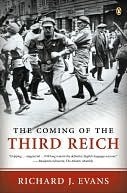Political power had moved elsewhere - to the circle around Hindenburg, with whom the right to sign decrees and the right to appoint governments lay, and to the streets, where violence continued to escalate, and where growing poverty, misery and disorder confronted the state with an increasingly urgent need for action. Both these processes greatly enhanced the influence of the army. Only in such circumstances could someone like its most important political representative, General Kurt von Schleicher, become one of the key players in the drama that followed.
Welcome back. Just a moment while we sign you in to your Goodreads account.


